Career Development Planning Tools for Your Workforce
Career Development Planning Tools for Cultivating a Skilled Workforce
Career development planning is a complex process. It requires a well-thought-out strategy that assists you in achieving long-term career goals. Self-assessment, skills analysis, goal setting, mentorship, and performance tracking are some of the critical pillars of career development.
To pursue career development, you as an employer need to empower your employees to learn new skills, update their resumes, answer mock interviews, and so on. With the help of the right tools, you can offer essential support to your employees to navigate their career paths effectively.
In this blog, we will share a list of the best career development planning tools that can help your employees advance in their careers and drive organizational success.
10 Career Development Planning Tools to Consider
Here is a list of career development planning tools you can invest in to support your employees’ career journey. These tools are designed to address specific aspects of growth.
#1. TalentGuard – All-in-one Career Development Planning Tool
TalentGuard is an excellent career development planning tool that helps you design personalized career paths and track your progress efficiently. It offers an AI-powered workforce intelligence engine that conducts skill gap analysis and provides holistic career pathing features to enhance employees’ professional development journey. The tool also offers a centralized platform with features like skill assessments, goal planning, mentorship, learning resources, and much more.
Key Features
- AI-powered career pathing and succession planning.
- Intelligent skill assessment and gap analysis.
- Personalized career recommendations.
- Internal talent marketplace
- Employee goal tracking.
- Mentorship, coaching, and learning tools.
Pricing
Free, with paid plans starting at $7 per month.
#2. Lucidchart – SWOT Analysis Tool
A SWOT Analysis Tool helps employees evaluate their strengths and identify weaknesses. It helps them explore possible opportunities and anticipate challenges for better career development and planning.
Lucidchart offers a mind-mapping tool that helps you create visual mind maps and flowcharts to conduct a comprehensive SWOT analysis.

Source: Lucid Chart
Key Features
- Simple drag-and-drop editor to create SWOT analysis charts.
- Built-in chat functionality to enable real-time team collaboration.
Pricing
Free, with paid plans starting from $7.95 per month.
#3. MBTI – Personality Assessment Tool
Employers widely use personality assessment tools to find the best-fit candidates for open roles based on their personality, behaviors, and abilities. These tools also ensure that the selected candidates gel well with the culture and role expectations.
Myers Briggs Type Indicator (MBTI) is one such personality test software that makes it convenient for you to find, engage, and hire internal talent without any hassles. It assesses various personality types and career fit by providing you insights into your employees’ communication styles, leadership traits, ideal career recommendations, and so on.

Source: MBTI
Key Features
- Better self-awareness with 16 distinct personality types.
- Personalized career recommendations depending on test results.
- Deep insights into how a certain personality type impacts career choices.
Pricing
Starts from $59.95 for individuals and goes up to $99.95 per participant for teams.
#4. Kickresume – Resume Builder
Resume-building tools help employees to create professional resumes, CVs, and cover letters.
Kickresume offers a powerful resume-building tool that can create stand-out resumes quickly and efficiently. It offers an extensive library of pre-existing attractive resume templates that can be customized based on job roles and industry.
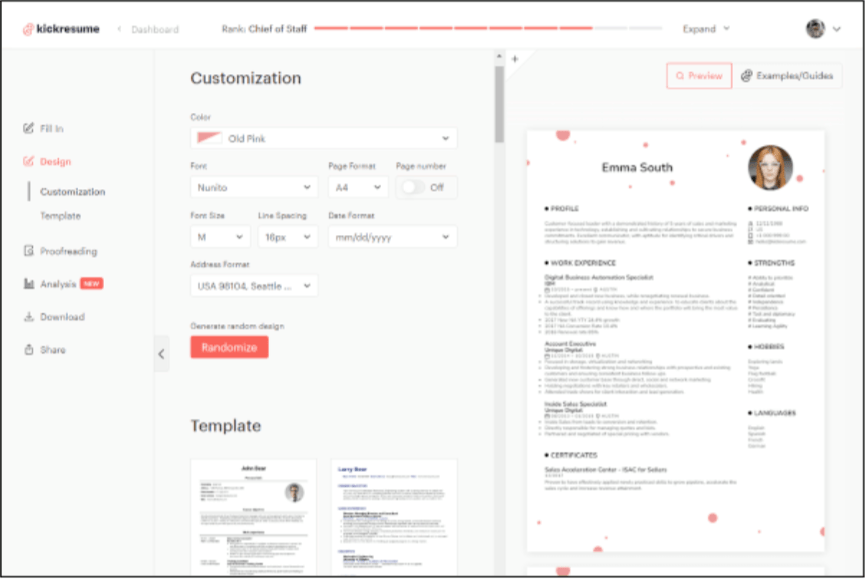
Source: Kick Resume
Key Features
- AI-powered resume builder offering step-by-step guidance on creating impactful resumes.
- Ready-to-use and ATS-optimized templates.
- Cover letter builder.
- Supports document exports in multiple formats.
Pricing
Free, with paid plans starting from $7 per month.
#5. Coursera – Online Learning Platform
Online learning platforms offer affordable educational resources to employees to learn from anywhere at their convenience.
Coursera is an online skill-based learning platform that enables employees to upskill in various fields in order to stay competitive in their careers. Its goal is to enhance skills to increase productivity, promote career advancement for growth, and foster a culture of ongoing learning within your company.
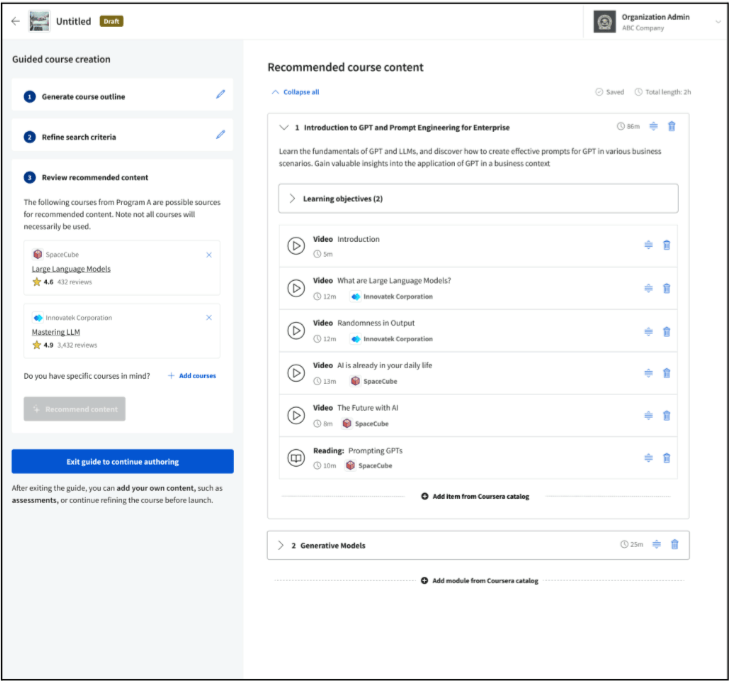
Source: Coursera
Key Features
- Access to numerous courses from prestigious universities.
- Flexibility to create a custom course.
- Provides professional certifications.
Pricing
Free for individuals, $399 per user per year for team plans.
#6. Qooper – Mentorship and Networking Platform
Mentorship and networking platforms connect employees with mentors, career counselors, and other networking opportunities aiding professional growth and facilitating career planning.
Qooper offers a mentorship platform that connects your employees with industry experts for guidance in their career development. It also is the best platform for expanding their professional connections.

Source: Qooper
Key Features
- Regular mentor feedback
- Mentorship based on career goals
- Networking opportunities
Pricing
Connect with the Qooper team to request pricing.
#7. Degreed – Skill Management Software
Skill management software enables you to gain real-time visibility into your workforce skills for pinpointing critical skill gaps and promoting targeted upskilling within your organization.
Degreed provides a robust skill management platform that enables you to identify skill gaps, track your employees’ learning progress, and develop customized career growth plans.

Source: Degreed
Key Features
- Thorough skill gap analysis.
- Personalized learning suggestions.
- Integration with other online learning platforms.
Pricing
Connect with the Degreed team to learn about pricing.
#8. Notion – Goal-Setting and Tracking Tool
A goal-setting and tracking tool enables employees to establish clear career goals and monitor their progress toward those goals. It also helps them measure their achievements thereby boosting motivation and accountability.
Notion is one such versatile tool that can be leveraged for goal setting and tracking. It offers a centralized workspace where your employees can set their goals and organize their tasks. Besides, they can track the progress of their projects
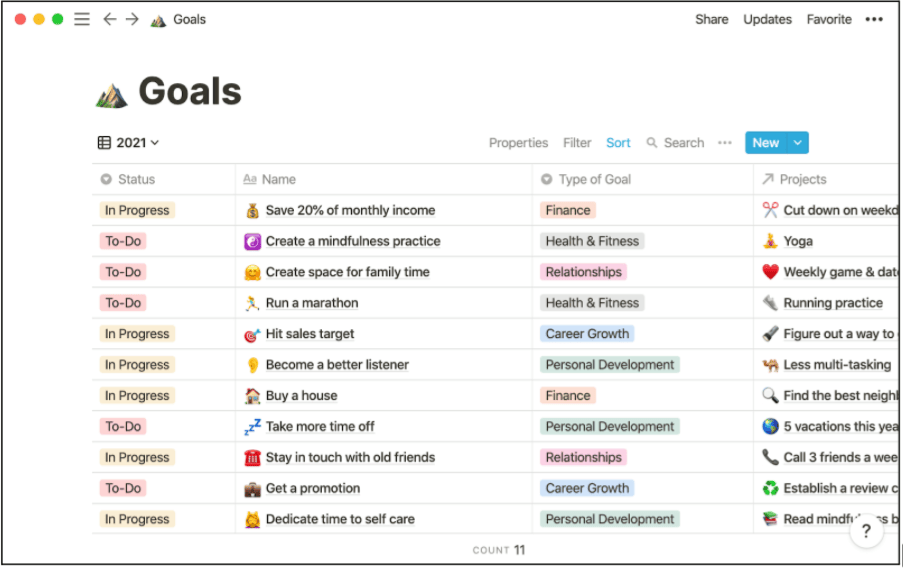
Source: Notion
Key Features
- Goal tracking
- Task management
- Integration with other apps
Pricing
Free, with paid plans starting from $12 per user per month.
#9. Interviewing.io – Interview Preparation Platform
Interview preparation platforms simulate real interview scenarios and conduct mock interviews to help employees prepare for job interviews. These platforms also have a solid network of industry professionals who share detailed feedback about these mock interviews.
Interviewing.io is an excellent tool for your employees to practice mock interviews with real professionals from top companies like MAANG. It encourages your employees to practice for interviews anonymously, making it a safe space to learn from their mistakes.
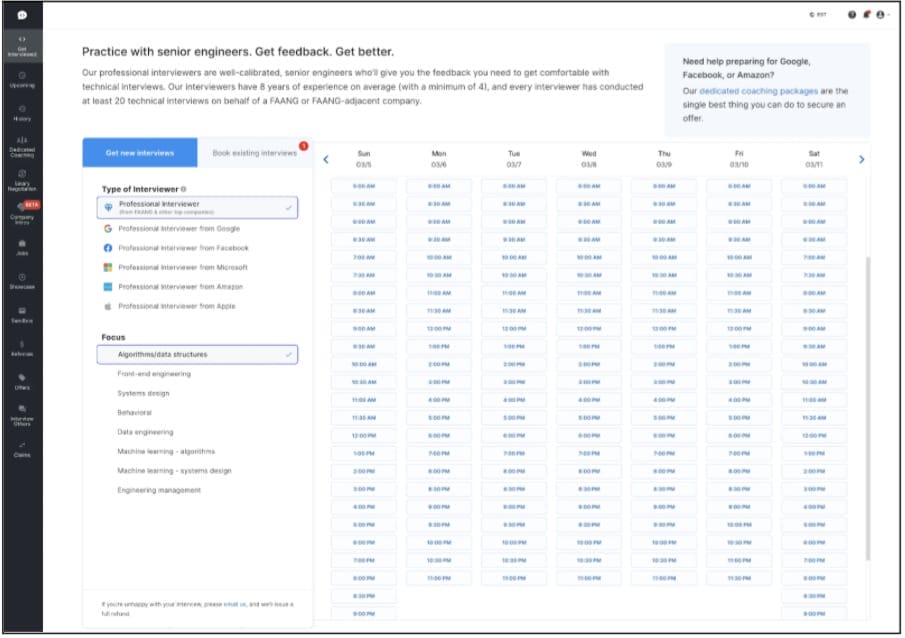
Source: Interviewing.IO
Key Features
- Anonymous mock interviews.
- Feedback from industry experts.
- Realistic interview practice.
Pricing
Connect with the Interviewing.io team to learn more about pricing.
#10. Wix – Portfolio Website Builders
Portfolio builders help your employees showcase their achievements and skills by sharing a collection of work samples, past projects, and client testimonials. Portfolios help them demonstrate their capabilities as a professional and stand out from the crowd of hundreds of applicants.
Wix is an all-in-one portfolio website builder that allows employees to create stunning and professional-looking online portfolios to present their skills and projects in an organized fashion.
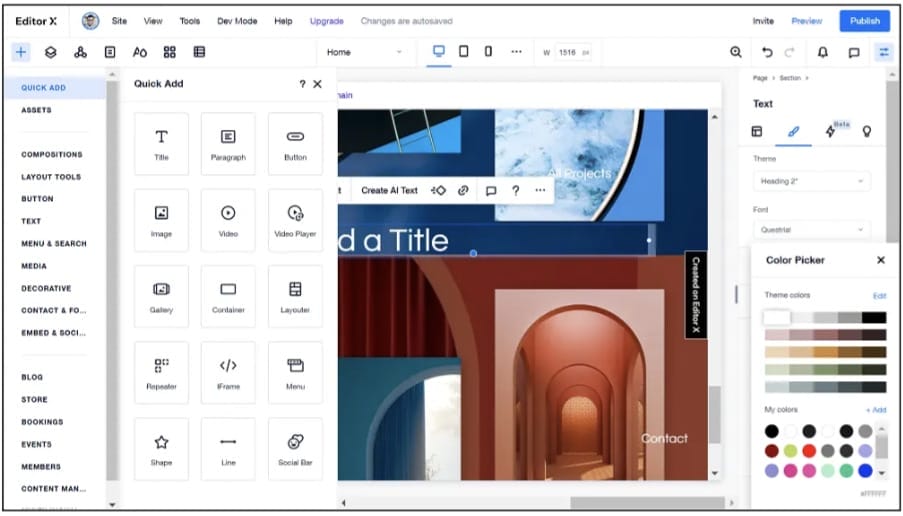
Source: Wix
Key Features
- Drag-and-drop website builder without requiring to write a single line of code.
- Ready-to-use website template library.
- Mobile-optimized and SEO-friendly websites.
- Supports images, video, and blog to showcase projects in an intuitive manner.
Pricing
Free, with paid plans starting from $17 per month.
Create a Culture of Continuous Learning and Growth with TalentGuard
Investing in career development planning tools is important for building a highly skilled and motivated workforce. These tools allow your employees to gain complete control over their professional development. They promote personalized learning via skill assessment, mentorship programs, learning guides, mock interviews, and so on.
You can take your organization’s career development planning efforts to the next level with TalentGuard. TalentGuard offers personalized career pathing tools, employee resource groups, an internal skill-based mobility platform, mentoring programs, and more to streamline career development in your organization.
What Are Career Planning Tools?
Career planning tools provide employees with a means to define what success looks like for them and identify the skills they need to achieve it. Whether digital or manual, these resources help people connect long-term ambitions with concrete actions. With structured guidance in place, career development shifts from uncertainty to intention. A modern career development platform combines self-assessment, continuous learning, mentoring, and analytics to provide employees with a clear view of their current standing and the steps needed to achieve their long-term goals.
When organizations adopt reliable career development tools, they transform career conversations from guesswork into evidence-based discussions. Employees gain visibility into potential roles and skill requirements, while leaders access real-time insights to support internal mobility and succession readiness. Platforms like TalentGuard’s Competency Frameworks help structure this process by linking skills, roles, and performance indicators within a single ecosystem.
Why Are Career Planning Tools Important?
Career planning tools are vital because they create transparency and empowerment in the workplace. Employees no longer have to rely on informal feedback or annual reviews to understand their progression—they can use career management tools to visualize skill gaps and set development milestones. For HR teams, these tools provide a clear framework for connecting the right people with the right opportunities, ensuring that every employee’s development aligns with and supports overall business goals.
Organizations that utilize career development software experience higher employee retention and engagement. A workforce that sees clear development pathways becomes more adaptable and future-ready. Employees who feel supported in their professional journey are more likely to learn, evolve, and contribute meaningfully. Organizations that embed structured career planning into their daily operations—rather than treating it as a one-time event—consistently outperform others in terms of resilience and readiness.
Career Planning Tools
Effective career planning combines insight, structure, and opportunity. A comprehensive career planning tool offers data-driven guidance at every stage, from self-assessment to goal tracking. Below are seven essential categories of career development platforms that can help employees take ownership of their careers, while providing HR leaders with the analytics they need to make informed talent decisions.
When these tools are integrated into your broader talent strategy, they create a consistent and measurable framework for employee development. Each one contributes uniquely, helping to elevate the employee experience and build a more agile, future-ready workforce.
1. SWOT Analysis
A SWOT analysis helps employees evaluate their Strengths, Weaknesses, Opportunities, and Threats. This simple framework offers a clear snapshot of current capabilities and future potential. By identifying internal skills and external opportunities, employees can plan realistic growth strategies.
Incorporating a SWOT analysis into a career development tool enables data to inform decisions. When employees align their SWOT analysis with company competency frameworks, they bridge the gap between personal ambition and organizational goals. To see how this connection accelerates learning and performance, review Skill Development Examples:contentReference.
2. Career Testing
Career testing tools evaluate a person’s interests, natural strengths, and personality traits to reveal which roles or career paths may be the best fit. They provide a strong foundation for thoughtful decisions when employees consider new opportunities or advancement within the organization.
Integrating career testing into a career development platform creates a continuous feedback loop, allowing employees to test, learn, and evolve their career paths over time. The results guide learning recommendations, mentorship matches, and even internal job opportunities—turning testing into a proactive career management strategy rather than a one-time evaluation.
3. Self-Assessment
Self-assessment tools give employees a chance to pause and reflect on their work—what comes naturally and where they tend to struggle. When people see their strengths and gaps clearly, they take real ownership of how they grow and where their careers are headed. These assessments often feed into centralized career management tools, helping HR track development progress and align training investments with performance outcomes.
Powered by AI-driven analytics, career development software like TalentGuard’s platform can compare employee assessments to benchmarked skill data. The insights help shape practical recommendations that employees can act on. When self-awareness meets the right technology, growth happens faster—for both individuals and the organization.
4. Research
Career research tools give employees insight into job market trends, industry forecasts, and emerging skill requirements. Understanding how roles evolve enables professionals to make more informed career decisions and stay ahead of change.
With advanced career development platforms, companies can consolidate market research, skill data, and learning paths in one centralized location. When people have access to accurate information, they can plan with confidence rather than assumptions. Research becomes the bridge that links personal ambition to the real opportunities waiting within the organization.
5. Community Resources
Technology makes learning more accessible, but it only goes so far. Real progress often comes from people—mentors, peers, and professional networks—who share honest feedback, encouragement, and perspective that keep careers moving forward.
Bringing these networks into career development tools enables collaborative, continuous learning. TalentGuard’s mentorship and coaching ecosystem connects employees with experienced professionals who help them navigate growth. When technology and community work together, companies build a culture where development feels ongoing and everyone has a sense of belonging.
6. Personality Tests
Tools such as the MBTI or Big Five show how personality traits relate to performance and job satisfaction. When employees understand what energizes them—and what doesn’t—it’s easier to choose roles that fit.
Embedded in a career development platform, personality insights enhance collaboration and leadership alignment. They also support succession planning by identifying leadership potential early. HR can integrate this data with career management tools to personalize learning at scale—ensuring each employee is placed where they can thrive. Explore related role structure concepts in Job Families and internal mobility via the Talent Marketplace:contentReference.
7. Career Planning Process
The career planning process brings all the above tools together into one structured workflow. Employees assess themselves, set goals, research opportunities, and continuously refine their plans based on feedback.
Modern career development software automates much of this process, guiding users through every stage—from assessment to learning to advancement. By leveraging an all-in-one career development tool like TalentGuard’s Development Planning Software, companies can create personalized, data-driven career paths that improve engagement and retention across the board:contentReference.
Final Thoughts
Investing in robust career planning tools equips your workforce to grow with confidence and clarity. When paired with a unified career development platform, these tools create an ecosystem that enables seamless collaboration among employees, managers, and HR on growth strategies.
When companies integrate tools such as SWOT analysis, self-assessments, mentoring, and personality tests into their digital career development platforms, they foster a culture built on learning and accountability. Employees stay focused on growth, and the organization creates a workforce that is not just ready to adapt to change but also to shape it.
FAQs
What are the 7 competencies?
The seven key competencies often recognized across industries include communication, teamwork, problem-solving, adaptability, leadership, critical thinking, and digital literacy. These represent the essential behaviors and skills employees need to perform effectively in most roles. Many organizations customize these core areas within their own competency frameworks to reflect specific business goals and culture:contentReference.
What is an example of a core competency?
A core competency is a strength that sets an organization or individual apart. For example, innovation can be a core competency when a company consistently develops creative solutions that outpace competitors. On an individual level, strong analytical skills or empathy-driven leadership can be personal core competencies that contribute to team success.
What are the nine basic competencies?
The nine foundational competencies typically include communication, teamwork, initiative, adaptability, learning agility, professionalism, leadership, planning and organizing, and decision-making. These provide a balanced mix of interpersonal, cognitive, and operational skills that help employees grow within their career development platform and support long-term organizational goals.
What are the five core competencies?
The five widely accepted core competencies are communication, collaboration, critical thinking, creativity, and self-management. Together, they define how effectively a person works, learns, and contributes in a professional environment. Developing these competencies through structured learning and feedback—supported by a digital career development tool and complementary career management tools—creates a stronger, more agile workforce.
Career Development Planning Tools – Get a Demo
Sign up for a free demo to learn how TalentGuard can help you unlock your workforce potential.
See a preview of TalentGuard’s platform
Global Career Map Challenges in Business
Organizations face the critical challenge of developing a clear and effective global career map for their employees. Without defined career progression, employees may feel uncertain about their future within the company, leading to disengagement, diminished productivity, and the loss of valuable talent. This blog explores the multifaceted challenges associated with creating global career paths and […]
Strategic Advantage of Internal Mobility
Let’s explore the strategic advantages of internal mobility in this blog. In today’s competitive talent market, finding candidates who match a role’s skill requirements and fit well into an organization’s culture can be a complex challenge. Beyond technical skills, qualities like reliability, teamwork, and a positive attitude are difficult to identify in external candidates and […]
Implementing Career Path Initiatives
Implementing career path initiatives has become a top priority for organizations seeking to retain and develop talent. These initiatives help companies provide clear growth pathways for employees, which, in turn, boosts engagement and reduces turnover. However, the success of such programs relies heavily on having accurate, structured data on skills and jobs. Unfortunately, many organizations […]




